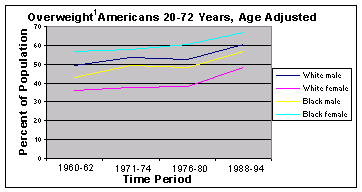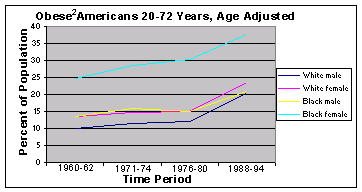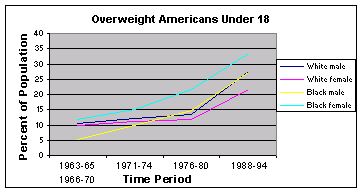African Americans and Diet
Let’s face it. Americans of all races tend to eat more and are less active than their ancestors, which, is contributing to the obesity epidemic in the US. Recent statistics show that up to 66% the US population is overweight or obese. These weight trends are even more pronounced among African Americans with 60% of African American men and 78% of African American women identified as overweight. In addition, 28.8% of men and 50.8% of African American women are considered obese. The charts below show that black women lead the population both in the numbers who are overweight and obese. In these statistics, the white and black race groups include persons of Hispanic and non-Hispanic origin.
SOURCE: Centers for Disease Control and Prevention, National Center for Health Statistics, Division of Health Examination Statistics.
Unpublished data, http://www.cdc.gov/nchs/fastats/overwt.htm.
1Body Mass Index (BMI) greater than or equal to 25.
2Body Mass Index (BMI) greater than or equal to 30.
Now for some good news. Eating a nutritious, low fat diet and participating in regular exercise are the best steps anyone can take toward preventing and treating obesity. Low fat eating habits and regular physical activity not only aid in weight reduction, but can also reduce the risk of several chronic diseases. Reducing weight by just 5-10% may reduce the risk of high blood pressure, diabetes, and heart disease. If you take medication for these conditions, you may require less once you’ve lost weight. This will help reduce side effects from medication, as well as medical costs.
For some African Americans, a family tradition of soul food may pose a problem for today’s less active lifestyle. Soul foods traditionally depend on fat, sugar and sodium for their flavor. By modifying recipes and decreasing portion sizes, African Americans may reduce their weight and the chronic diseases that accompany it.
What Factors Influence Diet?
Diseases Associated with Obesity
Take charge of your health, by taking charge of your weight
What Factors Influence Diet?
Culture, environment, and heredity are some of the factors that affect what we eat and how our bodies process food.
Culture
Many studies have shown that, in general, African Americans:
- Accept larger body sizes
- Feel less guilt about over-eating
- Are less likely to practice unhealthy dieting behaviors, such as over-exercising or purging
Although African Americans have a healthy acceptance of a wider range of body sizes, their tolerance may lead to more obesity and serious obesity-related health problems. To evaluate your weight, compare it to a body mass index (BMI) table. The higher your BMI, the higher your risk for chronic diseases. Just losing a little weight can make a big difference.
Environment
Environmental influences on what we eat include:
- Availability
- Convenience
- Cost
- What the others around us are eating
- What we were taught as children
Many families do not make nutrition a top priority, and children are suffering increasing obesity rates. In addition, the rate of type 2 diabetes and high blood pressure is on the rise in this population. The following chart shows the percentages of overweight children by race. “Overweight” is defined as body mass index (BMI) at or above the sex- and age-specific 95th percentile cutoff points calculated by the National Health Examination Survey (NHES).
SOURCE: Centers for Disease Control and Prevention, National Center for Health Statistics, Division of Health Examination Statistics.
Unpublished data, http://www.cdc.gov/nchs/fastats/overwt.htm.
Heredity
Some people may inherit genes that enable them to eat more than others, without gaining weight. Unfortunately, this is only a small percent of our population. On the other hand, many people inherit genes that make it difficult for them to lose weight. For most Americans, eating less and increasing physical activity is the best method for maintaining a healthy weight and good health.
Diseases Associated with Obesity
If you are obese, you are at serious risk for a wide variety of health problems. Several are described below.
Type 2 Diabetes
Being obese greatly increases the chances for developing type 2 diabetes. Type 2 diabetes usually affects adults. However, with the increasing rates of obesity in children, the risk of type 2 diabetes in teens is on the rise. African American teenage girls are at especially high risk. For information about diabetes and African Americans, click here.
Hypertension or “high blood pressure”
African Americans have higher rates of high blood pressure than other races. Obesity and consuming a diet high in sodium (found in salt) increase the risk for high blood pressure. To prevent hypertension, lose weight and cut back on dietary sodium found in table salt. Highly processed foods such as TV dinners, soy sauce, lunch meat, canned foods and “fast food” are also high in sodium. Left uncontrolled, hypertension may lead to strokes, heart disease, and kidney failure. For information about hypertension and African Americans, click here.
Cancer
Although the exact causes for different cancers are not known, most studies show a connection between diet and certain types of cancer. A high fat diet has been linked to colon, breast and prostate cancer. Consuming a low fat diet with plenty of fruits and vegetables is beneficial in preventing many types of cancer. For information about colon cancer and African Americans, click here. For information about prostate cancer and African Americans, click here.
Take charge of your health, by taking charge of your weight

In Order to Maintain Your Good Health
You can modify the USDA’s food pyramid to incorporate healthful soul food recipes. For healthful soul food recipes, try the following:
Heart Healthy Home Cooking African American Style (PDF version – requires Adobe Acrobat)
NOTE: This site contains a PDF document, which can be opened if you have Adobe Acrobat on your computer. The PDF document is formatted “cook book style,” with pictures and recipes that you can print out.
Here are some tips to help you lose:
Limit high calorie beverages such as soft drinks
A large soda from a fast food restaurant can have over 500 calories! That’s almost as much as a Big Mac®! Drink plain water– it saves you money and calories.
Cook your favorite foods with less added fat
If you usually deep-fry, try sautéing vegetables in low salt chicken or beef broth.
Replace fats like bacon grease and butter with olive or canola oil.
![]()
![]()
![]()
![]()
![]()
Lose weight slowly
If you skip your daily candy bar, you will save 250 calories a day. Skip the soda and bag of chips, and you’ve cut another 250 calories. Over a 4-week period, that can add up to a 2-4 pound weight loss! That might not seem like a lot, but slow, sensible weight loss will build good habits that last a lifetime.
Limit TV viewing time
Several studies have shown that as the number of hours of TV viewing goes up, so does a person’s weight. This is probably because of the “semi-conscious munching” of snack foods that often accompanies television watching, as well as decreased physical activity. Turn off the tube and get moving.
Write down what you eat
Studies have shown that when you write down what you eat, you tend to eat less. Keeping a food diary makes you more aware of your eating habits and also makes you more accountable for your actions.
Deal with emotions
Some people eat when they are stressed, angry, sad, hurt, or even happy! Try to be aware if you are eating for some reason other than hunger.
Get regular physical activity
Studies show that people who exercise regularly are much more likely to have long-term weight loss success. Keep exploring until you find a physical activity that suits you. Find a friend to join you. You’ll be more likely to maintain your exercise program if you have a friend to motivate you. Have you ever tried yoga? Do you enjoy a walk after dinner? Aim for 30-60 minutes of continuous activity 3-5 times per week.
Take charge of your health now and be proud of the beautiful individual that you are!
For more information:
Go to the African American Health health topic.


